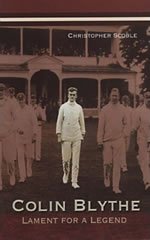Colin Blythe – Lament For A Legend
Archie Mac |Published: 2005
Pages: 215
Author: Scoble, Christopher
Publisher: SportsBooks Ltd
Rating: 3 stars

This is a very well written biography of the Kent legend and a tragic figure, Colin Blythe, one of the most sporting and nicest of men, who sadly lost his life during The Great War.
Unfortunately the problem with the book is the failure of the author to discover any new or meaningful information regarding his subject; no great discovery of a long lost diary; or any real moments of serendipity found during his research for the book.
This is no criticism of the author as Christopher Scoble appears to have interviewed and corresponded with everyone connected with Colin Blythe no matter how tenuous the connection.
He even interviews family and an elderly woman, who was a neighbour of the great man when a little girl, who remembers him ‘as a kindly man who used to give her sweets over the garden fence’.
During the book, Scoble takes us back to the 1950s when he was a child and grew up watching the Kent heroes of the day such as Colin Cowdrey.
He also relates the interesting story of his mother, who had been the sweetheart of Test cricketer Tom Goddard. A book on either of these subjects would certainly been an interesting premise for a cricket book, and would give Scoble the chance to do his obvious writing talents justice.
Colin Blythe who was known as ‘Charlie’, had a fairytale start to his cricketing life. Not known to have played any organised cricket as a youngster, he was attending a cricket match, when one of the Kent players came to the nets wanting a hit, and asked Blythe – who was just standing around – ‘to bowl me a few’. A Kent coach was standing by and, as they say, the rest is history. The 18-year-old became one of the greatest and most classical left-arm bowlers of all time.
Blythe was a marvel for Kent helping them win their first four county championships, but unfortunately this great success did not always carry over to the Test arena. This was for two reasons:
– Blythe was a contemporary of one of the greatest slow left-armers of all time, one Wilfred Rhodes, who was also far superior with the bat than Charlie Blythe.
– Blythe also suffered from epilepsy, which was brought on by mental stress, and became much more prevalent during the added pressures of Test matches.
This kept Blythe down to just 19 Tests but in that small number he was able to claim exactly 100 wickets at an average of 18.63.
When the Great War broke out in 1914, Blythe was one of the first to enlist, but tragically he was killed in 1917 aged 38 while serving as a sergeant. His two shrapnel-damaged wallets can be viewed in the pavilion at Canterbury.
If you are unfamiliar with the Colin Blythe legend, then this is a first-class biography of the great bowler.






Leave a comment